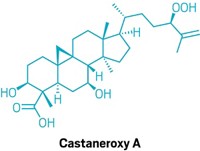Advertisement
Grab your lab coat. Let's get started
Welcome!
Welcome!
Create an account below to get 6 C&EN articles per month, receive newsletters and more - all free.
It seems this is your first time logging in online. Please enter the following information to continue.
As an ACS member you automatically get access to this site. All we need is few more details to create your reading experience.
Not you? Sign in with a different account.
Not you? Sign in with a different account.
ERROR 1
ERROR 1
ERROR 2
ERROR 2
ERROR 2
ERROR 2
ERROR 2
Password and Confirm password must match.
If you have an ACS member number, please enter it here so we can link this account to your membership. (optional)
ERROR 2
ACS values your privacy. By submitting your information, you are gaining access to C&EN and subscribing to our weekly newsletter. We use the information you provide to make your reading experience better, and we will never sell your data to third party members.
Pharmaceuticals
Pairing Drugs Kills Pathogens
Nonantibiotics such as Imodium and Antabuse can soup up the potency of weak antibiotics such as minocycline
by Sarah Everts
May 2, 2011
| A version of this story appeared in
Volume 89, Issue 18
The antidiarrheal drug Imodium (loperamide hydrochloride) and the alcoholism-aversion drug Antabuse (disulfiram) can both soup up a weak antibiotic called minocycline so that it kills pathogens such as methicillin-resistant Staphylococcus aureus and multi-drug resistant Pseudomonas aeruginosa (Nat. Chem. Biol., DOI: 10.1038/nchembio.559). Motivated by the alarming rise of antibiotic-resistant pathogens and the pharmaceutical industry’s retreat from antibiotic drug discovery, researchers led by Eric D. Brown and Gerard D. Wright at McMaster University, in Hamilton, Ontario, decided to see if some off-patent, nonantibiotic drugs might help minocycline—which several human pathogens are already resistant to—strike out harmful bacteria. Of the 1,057 drug pairs they tested, three of the nonantibiotics worked with minocycline against S. aureus, six such combinations killed P. aeruginosa, and five combinations eradicated Escherichia coli. In the case of the Imodium-minocycline pair, the team found that Imodium didn’t actually kill the harmful bacteria, but it did improve the pathogen’s uptake of minocycline, thereby improving the antibiotic’s potency. These unusual drug duets “show the potential for increasing antibiotic chemical space,” the researchers suggest.





Join the conversation
Contact the reporter
Submit a Letter to the Editor for publication
Engage with us on Twitter